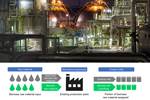Mitsubishi Chemical Group prepreg using plant-derived resin acquires ISCC Plus certification
Acquiring international sustainable and carbon certification drives the MCG Group’s efforts in environmental impact reduction in areas ranging from sports and leisure to mobility and industrial.
Carbon fiber-reinforced unidirectional BiOpreg. Source | Mitsubishi Chemical Group (MCG)
In November 2024, the Mitsubishi Chemical Group (MCG Group, Düsseldorf, Germany and Sacramento, Calif., U.S.) acquired ISCC Plus certification — an international certification system for sustainable products — for its prepreg products using plant-derived resin manufactured at Mitsubishi Chemical’s Tokai Plant (Aichi). In February 2025, the MCG Group commenced sample work for the BiOpreg #500 series, including carbon fiber prepreg and glass fiber prepreg, that are manufactured using the mass balance approach based on this certification.
The MCG Group’s bio-based epoxy prepreg offers the same performance as conventional petroleum-derived prepreg, and can be handled and molded in the same way. It is offered as an option for customers to choose from various “green” products. The use of mass balanced plant-derived epoxy, combined with low greenhouse gas (GHG) reinforcement — such as recycled carbon fiber and/or natural fiber like flax — can reduce the material’s carbon footprint.
The company is targeting sports and leisure applications for this product, with a long-term goal of its use in mobility — such as interior and exterior materials — as well as industrial markets. The company notes that within the mobility sector in particular, there is demand to reduce the environmental impact of products throughout their entire life cycle, set against a backdrop of environmental regulations.
Through the acquisition of this certification and the provision of certified products, the MCG Group plans to continue implementing sustainable products that use recycled and biomass raw materials.
Related Content
-
Infinite Composites: Type V tanks for space, hydrogen, automotive and more
After a decade of proving its linerless, weight-saving composite tanks with NASA and more than 30 aerospace companies, this CryoSphere pioneer is scaling for growth in commercial space and sustainable transportation on Earth.
-
Sulapac introduces Sulapac Flow 1.7 to replace PLA, ABS and PP in FDM, FGF
Available as filament and granules for extrusion, new wood composite matches properties yet is compostable, eliminates microplastics and reduces carbon footprint.
-
Carbon fiber, bionic design achieve peak performance in race-ready production vehicle
Porsche worked with Action Composites to design and manufacture an innovative carbon fiber safety cage option to lightweight one of its series race vehicles, built in a one-shot compression molding process.



